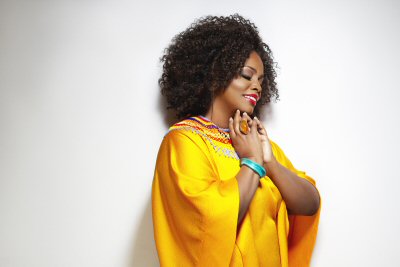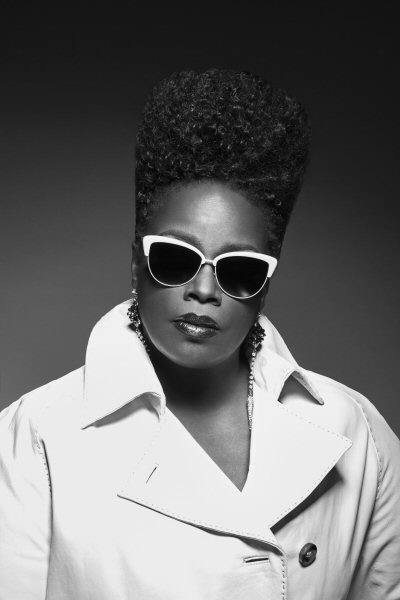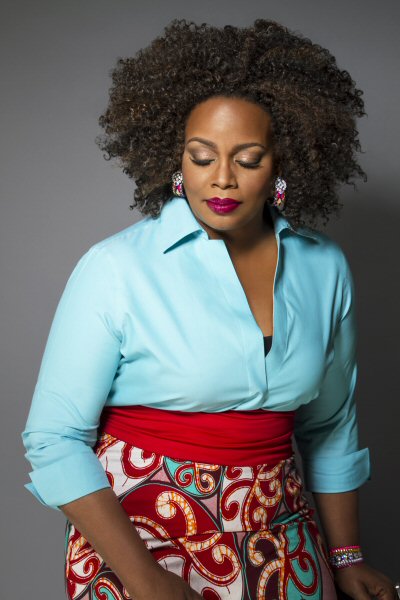DIANNE REEVES: BEAUTIFUL VOICE, BEAUTIFUL LIFE
Yes, I met her. She came here and performed at this club I used to work in downstairs. It was called The Warehouse. And the upstairs part of The Warehouse was where all the big acts performed. And downstairs was a place they called The Tool Shed. It was a smaller club and people would come there. There would be two shows a night, so that people waiting for the second show would just be there. And then they had a group of people that just liked being there, because the whole atmosphere was so hip. The stage was in the center of the room. I’d either have my sister, who was older than me, or one of my parents or aunts or something as a chaperone, because I was young, still in high school, but I was working with the great Gene Harris, who was a great pianist. He heard me and asked me, did I want to do a gig. And I did. I mean, Ike and Tuna Turner had been there. All kinds of people performed in this club. And Ella Fitzgerald was there and the altitude got to her, because we’re pretty high up. And they asked me, could I go up there and perform? And it was just amazing. So all of her clothes were still in the dressing room. And she had these really pretty blue patent leather pumps. And I put them on and went on stage. PCC: Was it daunting to fill in for her? REEVES: Oh, my God, yes! Because I had just seen her and she was doing music of The Beatles. I had just seen her and she was amazing. So I went up there and I only had to sing like two or three songs, but it was something [laughs]. PCC: How did it feel to be literally in Ella’s shoes? REEVES: I just felt like I at least had something to hold onto, to get me through. It was exciting. PCC: And then, George Duke, he played a big role in helping you get started? REEVES: Yeah, when I first went on Blue Note, in 1987, George produced those records. And he was an amazing human being, just amazing. PCC: What sort of advice did he give you? REEVES: Well, it was more example. Everything about him was excellence. It was second nature. And the thing that I loved was that it was all music to him. He didn’t break music into genres, but was respectful of what it took to play certain kinds of music. And he would arrange and play within that. So I loved that. So I was able to be really free, because I came up at a time when music had no boundaries. People weren’t really talking about genres and all of that kind of stuff. They were just talking about music. And everybody listened to everybody. And jazz musicians played the music of rock musicians and rock musicians invited jazz musicians to play on their stages. And it was an amazing thing. It was an amazing time. So, for me, working with George, it allowed me to have that license. I loved all kinds of music. So, on all my records, you hear those influences. As great as he as, he had his own sound. He would produce different artists. You would not hear his sound on their record. It was all about how they wanted to sound. That’s what I loved about him. PCC: As far as finding your own sound, your own voice, was that a gradual process or did you really always have your own style? REEVES: In the very beginning, I knew what I didn’t want to do. So that was how I made my choices. PCC: What did you not want to do? REEVES: Well, I always knew that I didn’t want to do music that didn’t mean anything to me, that didn’t mean something to me. So, in other words, I wanted to do music and sing songs that touched me in some sort of way, because it was all connected. And then as I continued on, I had like this voice that could do a lot of different things. And improvisation, in the very beginning, was really, really important. Then I started working with other artists like Sergio Mendes and Harry Belafonte early in my career and working and finding how important words were. And then I started to select lyrics that really meant something to me, taking out songs that, while maybe I like the melodies and stuff, I stopped singing them, because I didn’t like what they said. I just would learn as I continued on. And so, yeah, it’s been gradual, but it’s been good, solid. PCC: You mentioned Sergio Mendes and Harry Belafonte. Were those valuable lessons, touring with them? REEVES: Uh-huh. First off, touring with Sergio, was great, because here I had access to some of the most beautiful music in the world. And that is the music of Brazil, harmonies, poetry for lyrics, all the beautiful rhythmic movement, all of that kind of stuff. So I always loved it. I loved my time with him. Then, when I went with Harry, Harry was very socially conscious. And a lot of the songs we performed were folk songs from people all over the world. And some of them had dual meanings, because they were code for something else, for a movement or something. So I started to understand, while working with Harry, the power of words and how simplicity speaks volumes .And then the band that I worked with, with Harry, which was incredible, was like a mini-United Nations. There were people from everywhere. And the way that we would make arrangements for the songs, would be a workshop atmosphere - everybody bringing their culture to the arrangements of the music, so it just opened me up. It was an extraordinary time. PCC: And Clark Terry, did he become like a mentor to you?
Very early on, when I was in high school, I met Clark Terry. And he really was taken with my abilities and saw the potential and started inviting me to come and perform in his bands. And he had these like super bands, they used to call them. It was like the most fertile soil that any young person, coming up in this music, could ever hope to be in, because it was history there. There were the architects of the music there. What ended up happening was, I realized that the music was more of a conversation, a conversation that I wanted to be part of. So from Clark Terry, I realized that one of the things I didn’t want to be was just a singer out front with a backup band. I definitely wanted to be a co-creator with the musicians on stage. And that has always stuck. PCC: Scatting is kind of a lost art these days. Is that something that was just inside you? Is it something you could learn? REEVES: Well, improvisation, especially in black music, comes in many different forms. In gospel music, they have runs and they do all kinds of things. It’s not just about the wordless melodies. It’s also about phrasing and call-and-response. And once again, going back to that thing about having this communication within the band, hearing an idea and pushing the idea and making it come to fruition or turn into something else to create other ideas on stage. That’s all part of improvisation, as well. So for me, I don’t even say “scat,” because there’s just so many things happen. Like with my band, I go and we might change the whole arrangement. because it just feels right to go in another place, right there on stage. And those are the kind of things that I learned, being with Clark Terry - that the music is living. PCC: The film “Good Night and Good Luck,” the music was such a key part of it. What was that experience like? REEVES: That was great. I loved how George Clooney, the songs that he selected for the movie, and how it really worked. It was kind of the Greek chorus of the film. And I also loved the fact that everything was live, including my performances. When I was originally asked to do it, I thought I had to lip-synch. And he said, “No. This is jazz. I want you to do just what you do. That’s why I have you here.” And it was extraordinary. PCC: You’re still based in Denver now? REEVES: Yes, I am. PCC: You enjoy being a bit distanced from the craziness of L.A. and New York? REEVES: Uh-huh, I really do. I lived in New York. I lived in L.A. for many years. And when I want the crazy, I go to it. Then I come home to balance. PCC: And have you been able to find a real balance in your life? Or is all about music for you? REEVES: Music is a big part of my life. It’s not who I am. It’s what I do. And I certainly spend a lot of time. And that’s one of the reasons I came here to Denver, because I was raised here. I still have friends who just look at me as Dianne. I have family who just know me as Dianne, nothing more, nothing less. It’s just me. And I like being here. I like the atmosphere of the city. It’s growing. It’s like a big, small town. So I know all the people that work at the grocery store. And I know the people who work at the cleaners. And I like all that. I don’t stick out. And I’m just regular. PCC: As far as the rewards of what you do, how important are the things like the Grammy? Is it more about audience response? Or clicking with your fellow musicians? REEVES: Well, the audience is the one that has kept me going, throughout this whole journey. And I think that is probably number one for me. While I love the whole idea of the Grammys, because it’s your peers that select you. They’re the ones that vote and make the decisions on whatever, whether you’re nominated or the recipient of it. Either way it’s nice. PCC: And the most challenging aspect of a life in music, what have you found that to be? REEVES: Because I enjoy what I do so much, I have certain kind of independence. And it’s really, really important to me. So it’s really, really hard to have a relationship, when you’re traveling a lot. PCC: With years passing, more life experience, does that just enrich what you have to offer as a singer? REEVES: Absolutely, especially at this point in my life. I’m at a place where I can really look back and see how far I’ve come. And I find that I'm more relaxed and more even and more open and still excited and still want to keep growing. PCC: And with all you’ve accomplished, is there still a particular goal you’re burning to achieve through the music? REEVES: You know, one thing I learned, it was like in the mid-90s, I did this record called “Art & Survival.” And up till that point, I had pushed to make this happen, that happen. Some things happened. Some things didn’t. But the thing that was revealed to me was, there were more things that I didn’t even know could happen, that happened [laughs]. So I decided, from that point on, I was going to turn around, because I felt like I was always going upstream. I was going to turn around in the current and let it just take me. And so I’m open. You know? And that’s where I am now. PCC: When you’re totally caught up in the music, is that a rush? REEVES: When I step on the stage with my band, there are no inhibitions. There’s nothing else. We just do what we do. And it’s a kind of freedom. Some nights, it’s better than other nights. But every night is always 100 percent. And I just love the feeling that I get, when I’m up there. For the latest news on this artist, visit diannereeves.com. |


